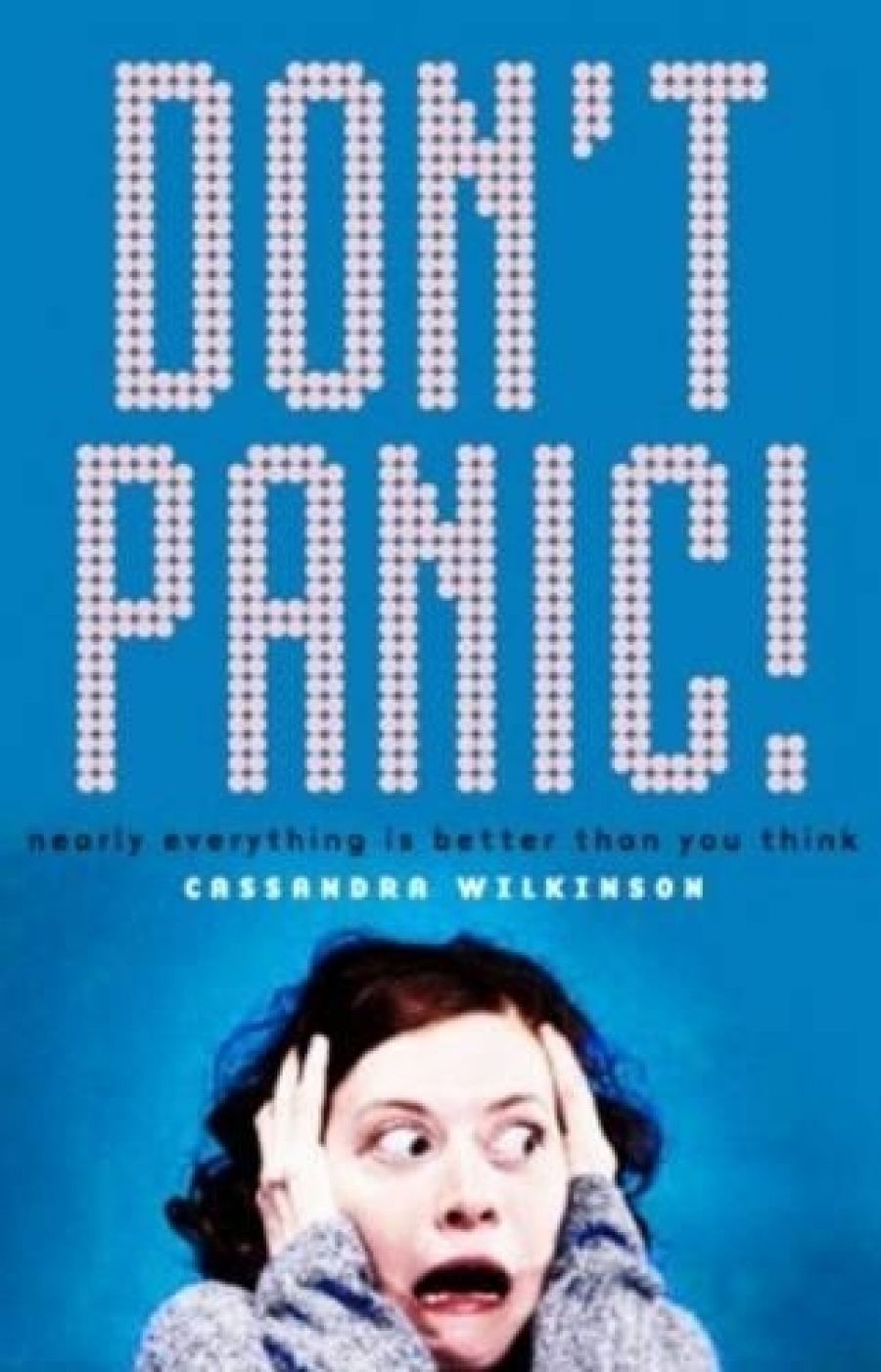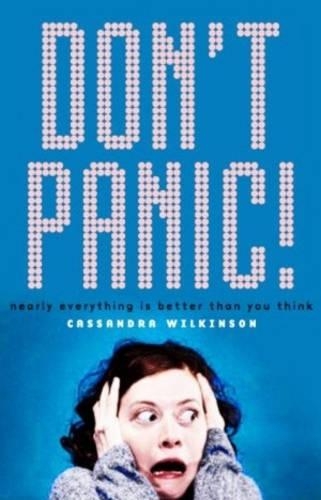
- Free Article: No
- Contents Category: Politics
- Review Article: Yes
- Article Title: A New Cassandra
- Online Only: No
- Custom Highlight Text:
After departing as minister for finance from the Hawke government in 1988, Peter Walsh began a weekly column for the Australian Financial Review under the byline ‘Cassandra’, named after the Trojan princess who was condemned by Apollo to be a teller of truths but fated not to be believed. Eventually, the bile became too much for Fairfax. Happily, Christopher Pearson offered Walsh a spot at his comely home for curmudgeonly old men, the Adelaide Review, for several more years. Walsh was marvellous. His articles were renowned for skewering the platitudes of the mushy left. He hollered like a Baptist at Country Party types aiming to get their gnarled hands into Treasury coffers.
- Book 1 Title: Don't Panic!
- Book 1 Subtitle: Nearly Everything is Better Than You Think
- Book 1 Biblio: Pluto Press, $29.95 pb, 203 pp
- Book 1 Cover Small (400 x 600):

- Book 1 Cover (800 x 1200):

Now we have a new Cassandra, the modish Cassandra Wilkinson. She matches her forebear in scorn for cant and humbuggery, Clive Hamilton a particular target. I lost count of how many times he is mentioned – the book has no index to provide an answer – but it is several, never kindly. Being predisposed to accept the premise of the title and sceptical of ‘affluenza’ arguments, I ought to have relished this book. There are chapters that dispute the new pseudo-science of happiness, the alleged demise of the family and community, and the alleged evils of capitalism, popular art and climate change. All of these are topics where the orthodoxy merits close scrutiny and a good beheading or two.
Alas, this book does not provide it. It suffers from glibness, as evidenced by the frequent use of pointless asides, many of them offensive, and the gratuitous sprinkling of pop-culture references throughout. It comes as no surprise to find that Wilkinson is an ex-ministerial adviser. I fear she has written too many speeches for her masters, and is unable to shake the habit.
Mostly, the book lacks gravitas. It pays insufficient respect to the concerns of our opinion leaders and, more importantly, to the situation that many ordinary Australians find themselves in. What do the following, all cited in the introduction, have in common: Peter Costello, John Anderson, Margaret Pomeranz, Anne Summers, Clover Moore, Lucy Turnbull, Tim Costello, Frank Brennan, and Clive Hamilton? To Wilkinson they are all panic-merchants ‘talking about a greedy, vacuous, miserable Australia – an Australia I don’t recognise’. Well, what I don’t recognise is the truth of that statement.
Opinion leaders are competing in a crowded ideas market. If they overreach themselves with a touch of hyperbole on occasion, that does not, of itself, negate their argument. Wilkinson lays fault on the media for dwelling on dramatic exception. That is its stock-in-trade, as it has been for centuries. While most of us hover securely around the median, we look to the extremes for titillation. Wilkinson fails, however, to take the next step or to explore the apparent consistency in what the media publish. Perhaps they are on to something?
Wilkinson thinks we are in thrall to our opinion leaders. However, it is quite possible that the reverse applies and that they are mirroring community concerns. There might be cause not to panic but to acknowledge that there is an issue and then to have a mature debate about what might be done. By not even contemplating the possibility, Wilkinson shows a lack of empathy with many in the community.
In 2006, the Australian Bureau of Statistics conducted a general social survey of the population. They found that three out of five adult Australians experienced an episode of personal stress during 2006, encompassing matters such as serious illness, the death of a loved one, divorce or a bout of depression. Half of all single parents said that they had difficulty managing their finances and that, on occasion, they delayed paying bills or did without heating or food. These are numbers that cannot be swiped away with a sassy quip. Wilkinson is too busy attempting to knock off the tall poppies to probe more deeply. She also draws too frequently from personal experience. At one stage, she boasts about living on the minimum wage while at university, ‘copping Sydney rent and still having enough money for great shoes’. In other words, there is no such thing as poverty. But Wilkinson’s condition was temporary and her prospects were huge.
How are we to live and make sense of our world? ‘I’m surrounded by all this stuff that I eat or use and I couldn’t actually make a single thing … I’m completely dependent on my society, but I play no useful role in it,’ says Bruno Clément in Michel Houellebecq’s novel Atomised (1998). Zygmant Bauman has brilliantly dissected our modern condition in his series of books on ‘liquid life’. In the most recent, Liquid Times (2007), he argues that modern progress brings a ‘relentless and inescapable change’ that overwhelms and confronts a ‘heteronomous, hapless and vulnerable population’, with forces ‘it neither controls nor fully understands’. Bauman is not referenced at all in Don’t Panic!, an irredeemable omission were it an academic work.
On most matters, Wilkinson’s view is that all is for the best in this best of all possible worlds. Where it is not, her prescription is deregulation and more competition, straight from the neo-liberal handbook. The question must be asked as to where Pluto Press, a once redoubtable critical publisher, is heading under Evan Thornley’s ownership. Thornley is also behind the scenes of the newly established think-tank Per Capita, which is attempting to position itself as a progressive counterpoint to Hamilton’s Australia Institute. If it, too, were to adopt the Panglossian view of the world advocated by Wilkinson, it would quickly fade into irrelevancy.
In 1930, in the midst of the greatest economic downturn of the modern era, John Maynard Keynes published a remarkably prescient essay entitled ‘Economic Possibilities for Our Grandchildren’. Looking forward one hundred years, Keynes imagined a world of plenty in which ‘problems of economic necessity have been practically removed’. Almost eighty years later, we find ourselves in amazing times: we have untold opportunity, freedom and prosperity. I agree with Wilkinson that we need more optimism about our future and we also need to stand up against the ne’er-do-wells. The world has been kind to Wilkinson, but it has not been kind to all, even confining our attention to this country. Our task for the future is to use that prosperity and our imaginations to respond creatively to legitimate community concerns.


Comments powered by CComment